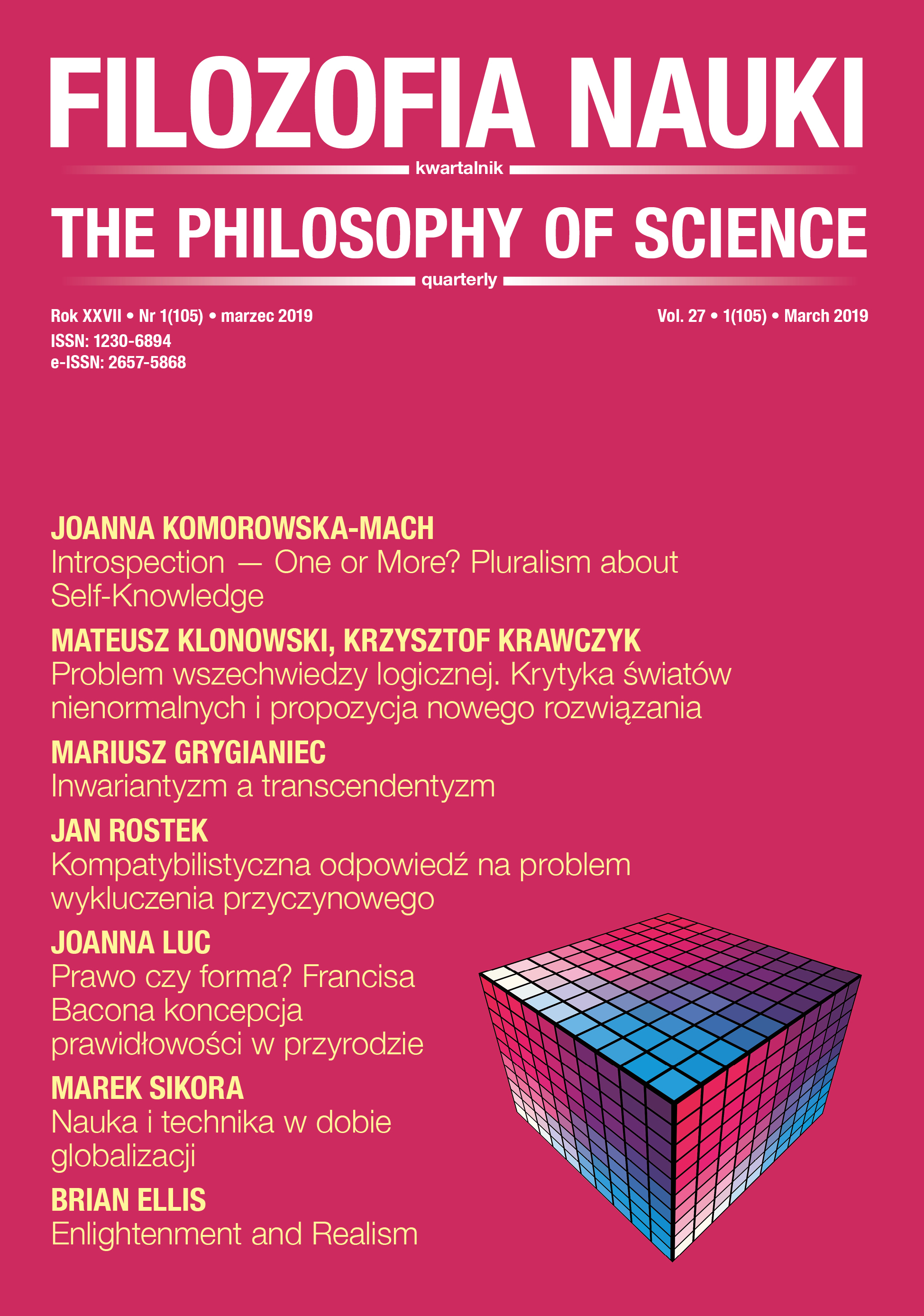The Compatibilist Reply to the Causal Exclusion Problem
DOI:
https://doi.org/10.14394/filnau.2019.0004Keywords:
non-reductive physicalism, compatibilism,, causal exclusion, counterfactuals, overdeterminationAbstract
The causal exclusion problem, as presented by Jaegwon Kim, is aimed to show that non-reductive physicalism is self-contradictory, as it is impossible for effects already having a sufficient physical cause to have a distinct mental cause. One possible reply to Kim’s argument is compatibilism — a view within non-reductive physicalism that states that psychophysical supervenience is able to sustain the coexistence of efficacious mental and physical causes. The aim of this paper is to describe the currently most popular compatibilist strategy, as well as to present and evaluate some objections to it. First, I sketch the causal exclusion problem and show how compatibilists could undermine the causal exclusion principle using counterfactual analysis. Then I point out why this is a troublesome and insufficient tool and what challenges await compatibilism in its current form.
References
Bennett K. (2003), Why the Exclusion Problem Seems Intractable, and How, Just Maybe, to Tract It, "Noûs" 37(3), 471-497. https://doi.org/10.1111/1468-0068.00447
Carey B. (2011), Overdetermination and The Exclusion Problem, "Australasian Journal of Philosophy" 89(2), 251-262. https://doi.org/10.1080/00048401003745993
Chalmers D. (1996), The Conscious Mind. In Search of a Fundamental Theory, Oxford: Oxford University Press.
Crane T. (2000), Dualism, Monism, Physicalism, "Mind & Society" 1(2), 73-85. https://doi.org/10.1007/BF02512314
Davidson D. (2001), Mental Events [w:] Essays on Actions and Events, Oxford: Clarendon Press, 207-225. https://doi.org/10.1093/0199246270.003.0011
Francescotti R. (2014), The Problem of Extras and the Contingency of Physicalism, "Philosophical Explorations" 17(2), 241-254. https://doi.org/10.1080/13869795.2013.787115
Horowitz A. (1999), Is There a Problem in Physicalist Epiphenomenalism?, "Philosophy and Phenomenological Research" 59(2), 421-434. https://doi.org/10.2307/2653679
Hyslop A. (1998), Methodological Epiphenomenalism, "Australasian Journal of Philosophy" 76(1), 61-70. https://doi.org/10.1080/00048409812348191
Jackson F. (1994), Armchair Metaphysics [w:] Philosophy in Mind, M. Michael, J. O'Leary-Hawthorne (eds.), Dordrecht: Kluwer, 23-42. https://doi.org/10.1007/978-94-011-1008-2_3
Kallestrup J. (2006), The Causal Exclusion Argument, "Philosophical Studies" 131(2), 459-485. https://doi.org/10.1007/s11098-005-1439-x
Kim J. (2001), Superweniencja jako pojęcie filozoficzne, tłum. R. Poczobut, "Roczniki Filozoficzne" 49(1), 195-227.
Kim J. (2002), Umysł w świecie fizycznym, tłum. R. Poczobut, Warszawa: IFiS PAN.
Kim J. (2008), Mit nieredukcyjnego materializmu, tłum. P. Gutowski, T. Szubka [w:] Analityczna metafizyka umysłu, M. Miłkowski, R. Poczobut (red.), Warszawa: IFiS PAN, 76-97.
Kroedel T. (2015), A Simple Argument for Downward Causation, "Synthese" 192(3), 841-858. https://doi.org/10.1007/s11229-014-0600-5
Kroedel T., Schulz M. (2016), Grounding Mental Causation, "Synthese" 193(6), 1909-1923. https://doi.org/10.1007/s11229-015-0820-3
Lewis D. (1973), Causation, "The Journal of Philosophy" 70(17), 556-567. https://doi.org/10.2307/2025310
Lewis D. (1983), New Work for a Theory of Universals, "Australasian Journal of Philosophy" 61(4), 343-377. https://doi.org/10.1080/00048408312341131
Lewis D. (2000), Causation as Influence, "The Journal of Philosophy" 97(4), 182-197. https://doi.org/10.2307/2678389
Loewer B. (2001), Book Review: «Mind in a Physical World», "The Journal of Philosophy" 98(6), 315-324. https://doi.org/10.5840/jphil200198612
McLaughlin B., Bennett K. (2014), Supervenience [w:] The Stanford Encyclopedia of Philosophy (Spring 2014 Edition), E. N. Zalta (ed.), https://stanford.io/2SkuxMn.
Merricks T. (2001), Objects and Persons, Oxford: Oxford University Press. https://doi.org/10.1093/0199245363.001.0001
Moore D. (2017), Mental Causation, Compatibilism, and Counterfactuals, "Canadian Journal of Philosophy" 47(1), 20-42. https://doi.org/10.1080/00455091.2016.1218254
Pereboom D. (2002), Robust Nonreductive Materialism, "Journal of Philosophy" 99(10), 499-531. https://doi.org/10.2307/3655563
Polger T., Shapiro L. (2016), The Multiple Realization Book, Oxford: Oxford University Press. https://doi.org/10.1093/acprof:oso/9780198732891.001.0001
Schwitzgebel E. (2014), The Crazyist Metaphysics of Mind, "Australasian Journal of Philosophy" 92(4), 665-682. https://doi.org/10.1080/00048402.2014.910675
Sendłak M. (2014), Realizm modalny i okresy warunkowe z niemożliwymi poprzednikami, "Filozofia Nauki" 22(4) [88], 91-107.
Sider T. (2003), What's So Bad about Overdetermination?, "Philosophy and Phenomenological Research" 67(3), 719-726. https://doi.org/10.1111/j.1933-1592.2003.tb00321.x
Tse P. U. (2015), Ontological Indeterminism Undermines Kim's Exclusion Argument, https://philarchive.org/archive/TSEOIU.
Yablo S. (1992), Mental Causation, "The Philosophical Review" 101(2), 245-280. https://doi.org/10.2307/2185535
Wilson J. (2005), Supervenience-Based Formulations of Physicalism, "Noûs" 39(3), 426-459. https://doi.org/10.1111/j.0029-4624.2005.00508.x
Zhong L. (2017), Semantic Normativity and Semantic Causality, "Philosophy and Phenomenological Research" 94(3), 626-645. https://doi.org/10.1111/phpr.12231



















 Filozofia Nauki/The Philosophy of Science | ISSN 1230-6894 | e-ISSN 2657-5868
Filozofia Nauki/The Philosophy of Science | ISSN 1230-6894 | e-ISSN 2657-5868